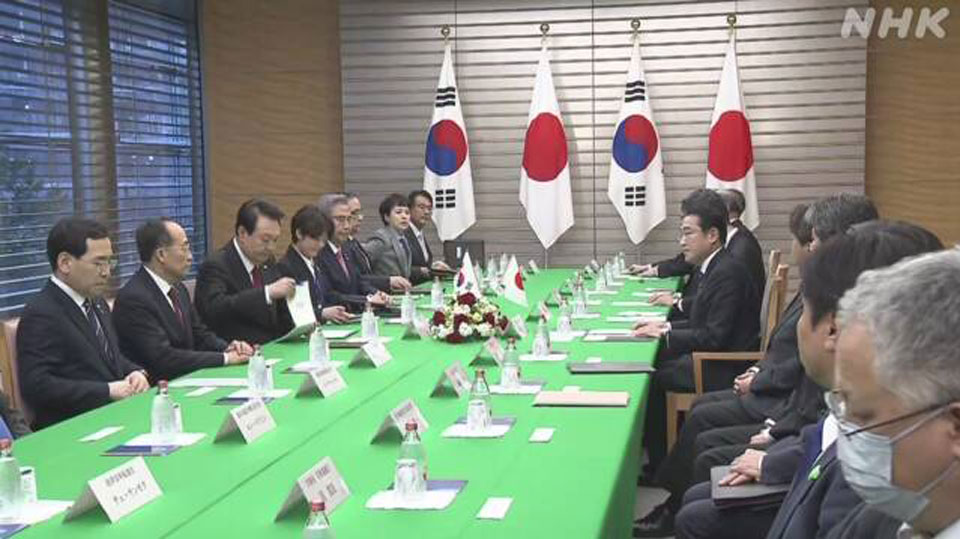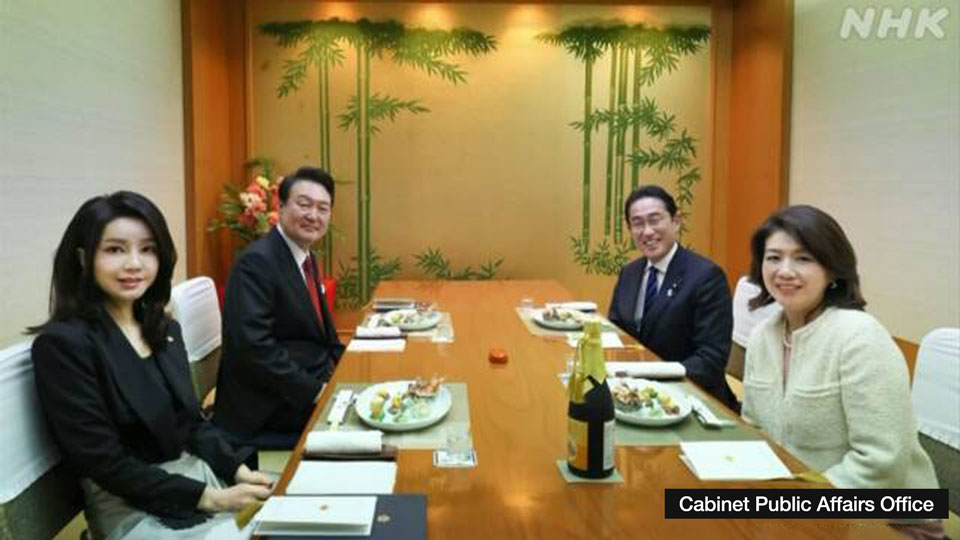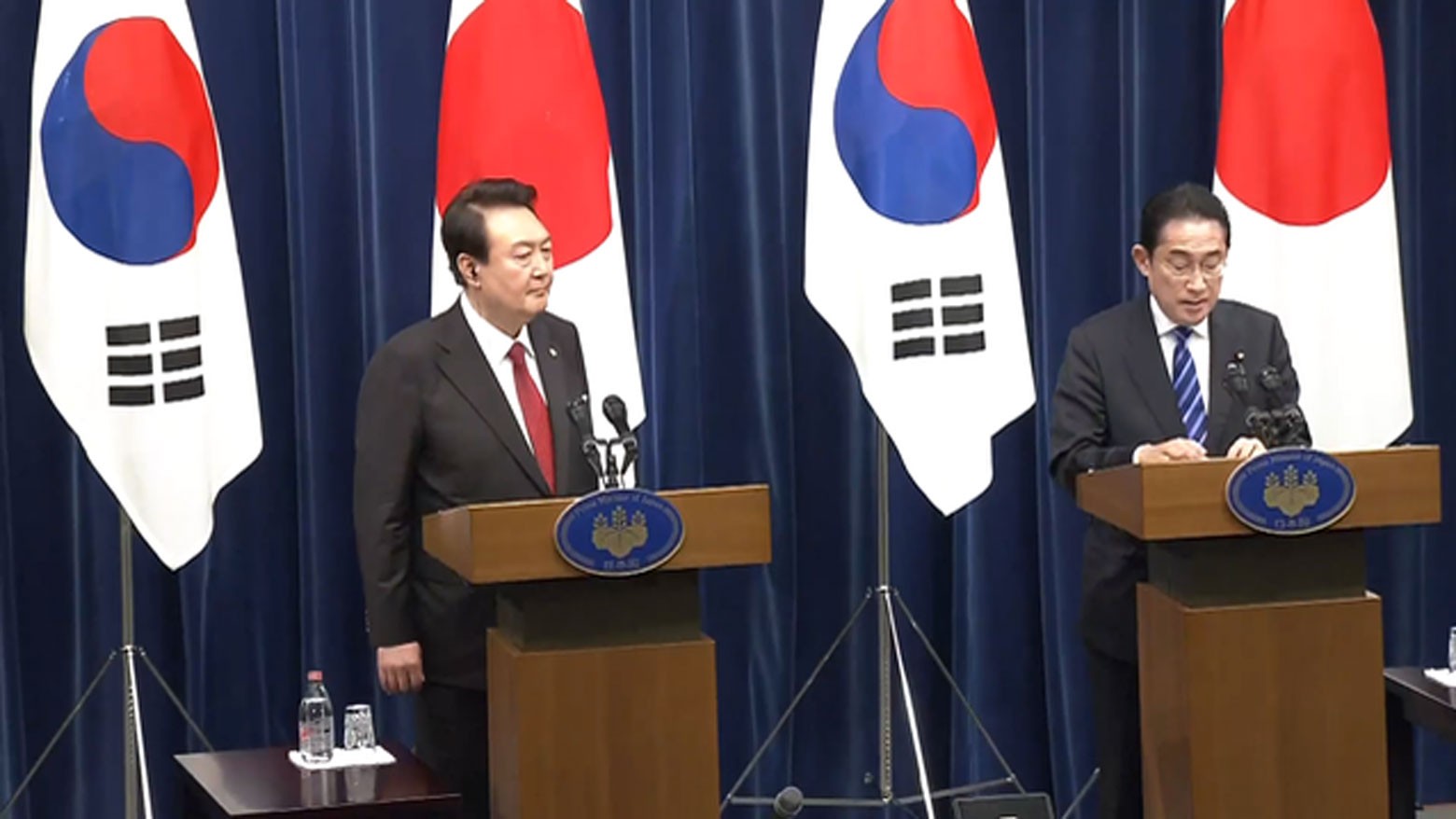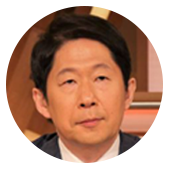A relationship of ups and downs
A metaphorical rain has been falling for more than a decade when it comes to relations between Tokyo and Seoul. The March 16 meeting of Prime Minister Kishida Fumio and President Yoon Suk-yeol was the first bilateral summit in 12 years.
A trip to the Takeshima Islands by then South Korean President Lee Myung-bak in 2012 was a low point. The visit to the South Korea-controlled islands, which are claimed by Japan, was an expression of discontent over Tokyo's stance on those referred to as comfort women. The Japanese public reacted strongly to the gesture.
South Korea's next president, Park Geun-hye, insisted in a speech in 2013 that the historical positions of aggressor and victim would not change even with the passing of a thousand years.
Then came a breakthrough. Tokyo and Seoul agreed to resolve the comfort women issue finally and irreversibly. It was then foreign minister Kishida Fumio who announced the groundbreaking deal on the Japanese side. Japan expressed its most sincere apologies to the women and paid more than $8 million to a South Korean foundation tasked with helping them.
But the improved atmosphere didn't last long. The South Korean administration changed from conservative to liberal when Moon Jae-in took the presidency. He was against the agreement and allowed the foundation for the comfort women to be dissolved.
Meanwhile, a row over wartime labor added fuel to the fire. The South Korean Supreme Court ordered Japanese companies to pay compensation to those who say they or members of their family were forced to work for the firms.
Tokyo responded sharply, insisting the issue had been settled in a complete and final way under a 1965 bilateral agreement. The Japanese administration of the time stressed that the court ruling would shake the legal basis of the bilateral relationship.
Japan imposed stricter export controls on materials used to make semiconductors in a move targeting South Korea.
Seoul viewed the measure as retaliation and threatened to pull out of GSOMIA, an intelligence-sharing pact between the two countries.
The outcome of the Tokyo summit
The question now is what kind of effect the latest summit will have. It seems set to improve things markedly, at least in the short term. Yoon's visit is itself symbolic of improved relations given that the last such meeting between the two nations was in 2011.

The wartime labor issue is perhaps the last big sticking point between the two neighbors. President Yoon stressed the workability of his plan for resolving the matter by having a foundation pay the plaintiffs instead of Japanese firms, something that Kishida welcomed. If the two nations can put aside their differences on this point, there's nowhere to go but up.
The question is how Yoon's attempt to tout the plan will be received back home.
Opposition parties and civil groups in South Korea have called the settlement a one-sided concession. Just one day before the summit, some of the plaintiffs in wartime labor cases filed a new lawsuit. They reject the government's plan and want a Japanese firm to pay damages, not the foundation.
This backdrop meant Yoon could not afford to go home empty-handed. He needed to be able to show something that would be seen as a diplomatic win.
And we did see some agreements come out of the talks. The leaders will resume regular visits to each other's countries. They also said foreign and defense officials will restart security talks. President Yoon said he will normalize the GSOMIA.
Japan announced it will lift strict export controls aimed at South Korea.
Along with this fillip, business groups in both countries said they will each establish foundations to cooperate on matters of shared concern such as climate change and energy security. Yoon can talk all of these up as gains.

What's next
What stands at the heart of most of the disputes between the two countries is history. In a joint press conference, Kishida noted that his administration would continue to adhere to "previous government declarations."
That is meaningful since these include the phrase "deep remorse and a heartfelt apology" regarding Japan's colonial rule of the Korean peninsula. But it is perhaps also noteworthy that Kishida did not actually repeat those words.
This will make it difficult for South Koreans to measure his sincerity and could harm President Yoon's effort to sell his plan for the wartime labor issue at home.
The Japanese leader is possibly wary of alienating hawkish members of his Liberal Democratic Party who have expressed strong opposition to any kind of apology. With this in mind, it is difficult to predict just how long the improved atmosphere in which he and his South Korean counterpart are now operating will last.

